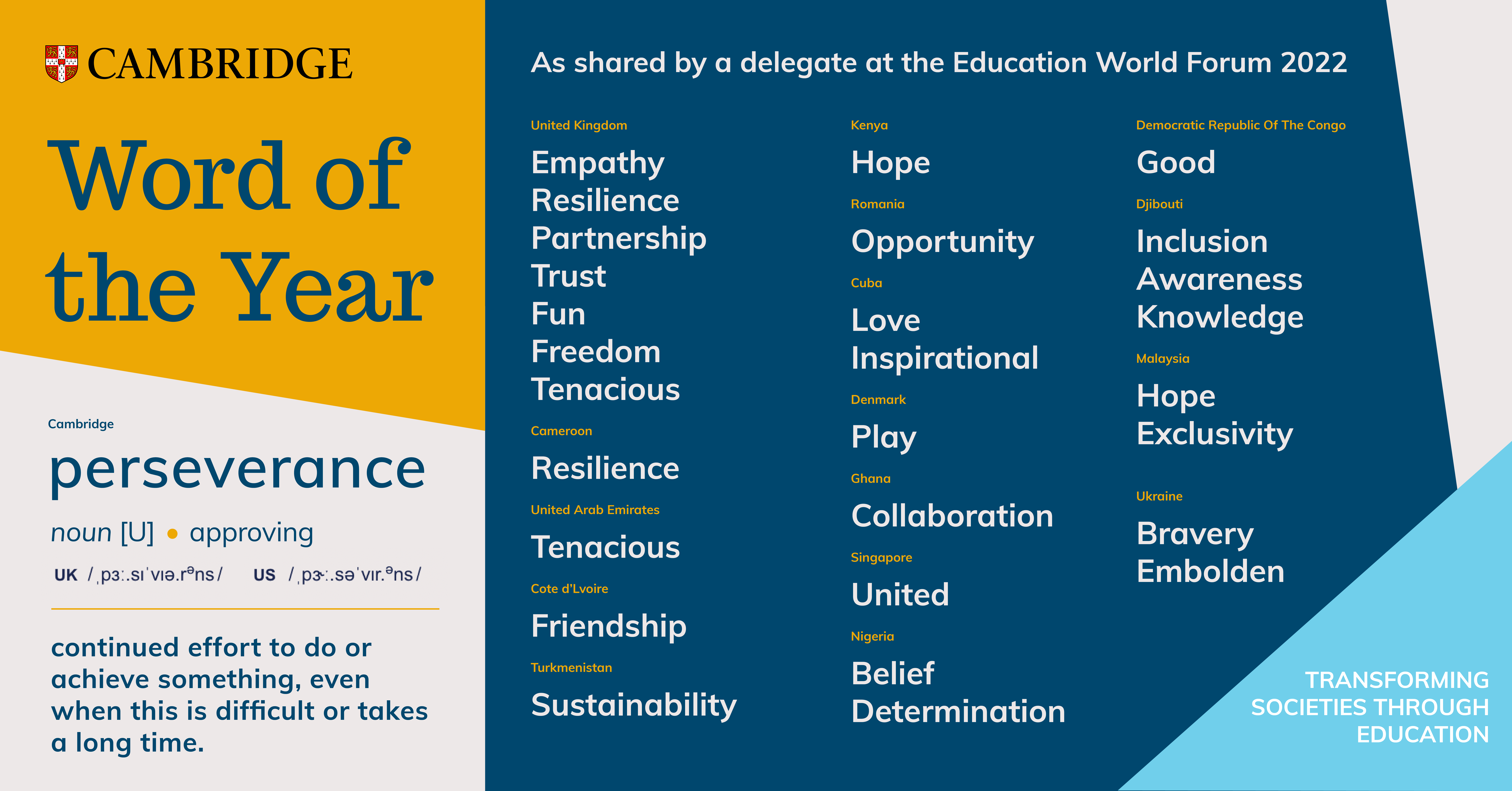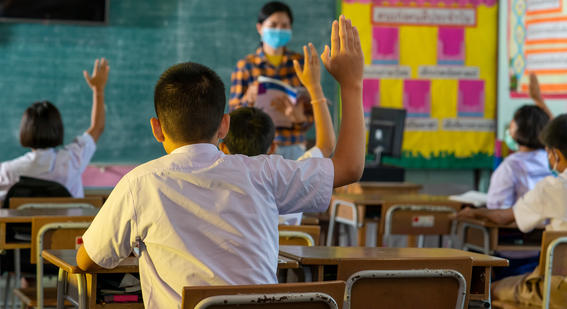Education transformation at the EWF 2022: Urgent. Ambitious. Possible.
22 – 25 May, 116 ministers gathered in London for the Education World Forum 2022.
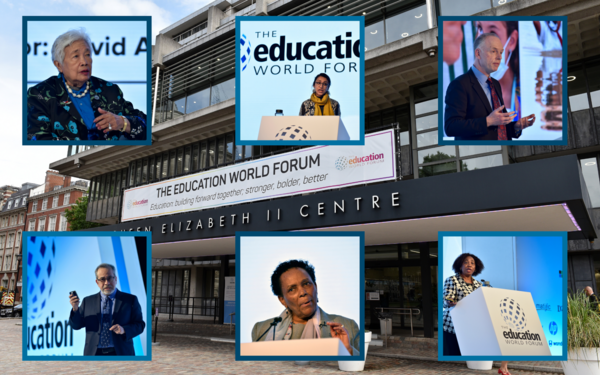
Each of us left the Education World Forum (EWF) with our own personal takeaways – but none of us could have missed the sense of urgency, ambition and possibility that fizzed in the air for three days.
Education ministers described a pivotal moment. A series of choices that will impact not only the education of a generation, but the future of the world. Speakers warned of the extreme losses we risk if we do not ‘act now’ – but also of the scale of the challenges that lie ahead.
As a group, we began to explore: how do we take effective action when we need to move both quickly and ambitiously? Many leaders suggested rising to the challenge together, in partnerships, could make all the difference.
View some of our highlight in this 30 second video:
A crucial moment for education reform
Dr Ruth Kagia, the Deputy Chief of Staff for Kenya who led the establishment of the Global Partnership for Education, opened her formal address with a quote from Shakespeare:
There is a tide in the affairs of men, which taken at the flood, leads on to fortune. Omitted, all the voyage of their life is bound in shallows and in miseries. On such a full sea are we now afloat. And we must take the current when it serves, or lose our ventures.
The flood: the “biggest crisis in education in one hundred years” outlined by Jaime Saavedra, Global Director for Education at the World Bank. It includes a 100% increase in depression and anxiety among children and an “inequality catastrophe”. Education has the potential to be the great equaliser, ministers shared.
Leaders and experts alike emphasised how quality education across the course of an individual’s life is at the heart of their opportunities. “If you come from a privileged background, you have lots of chances in your life. But if you come from a poor background you have just one: meet a great teacher and enrol in a great school,” said Andreas Schleicher, Director for Education and Skills at the OECD.
Dr Kagia’s words echoed as Minister of Education and Science for Ukraine, Serhiy Shkarlet, and Afghan children’s rights activist Freshta Karim took to the stage next and put the spotlight on those most vulnerable children.
Freshta highlighted the fears and pains of young people in Afghanistan. Afghan girls have been barred from secondary schools since last August and many are protesting. Freshta questioned whether the outcry would be as strong if women and girls had not had access to education recently. If we cannot recover education now – what does that mean for those who come next?
Minister Shkarlet spoke of the disruption to the “global value” of education amid the immense suffering of his nation. He described the pace at which the Ukrainian government is responding so as not to lose the continuity of education, learning and research for a generation. He praised the teachers and students prioritising schooling in the most difficult of times – and recognised the importance of their efforts to their own futures and the future of Ukraine.
Dr Amel Karboul, CEO of the Education Outcomes Fund, drew attention to just how far we are from achieving quality education for everyone around the world. UN Sustainable Development Goal 4 is the collective international target to achieve this by 2030. She showed the huge financing shortfall to meet this goal ($33 billion per year) and how most countries are not on track to meet their targets.
Jaime Saavedra pointed to how not only are we not meeting targets – the situation is getting worse, with learning poverty in many countries increasing from 53% to 70%. He told the packed room of education leaders we need to reverse this trend and accelerate it. Now.
Discussion of these sobering facts was not the sole driver of the sense of urgency at the EWF. Ministers showed how the ‘full sea on which we are now afloat’ must also encompass the creativity and productivity demonstrated during the pandemic. Leaders described unparalleled opportunities for fast innovation – from rethinking what is essential in their curriculum, to introducing digital capabilities.
Minister Hamad bin Mohammed Al Al-Sheikh of the Kingdom of Saudi Arabia estimated that the pandemic accelerated education reforms that would have taken 10 years down to two years. Speakers set themselves and others the challenge of building on this momentum for long-term improved learning outcomes.
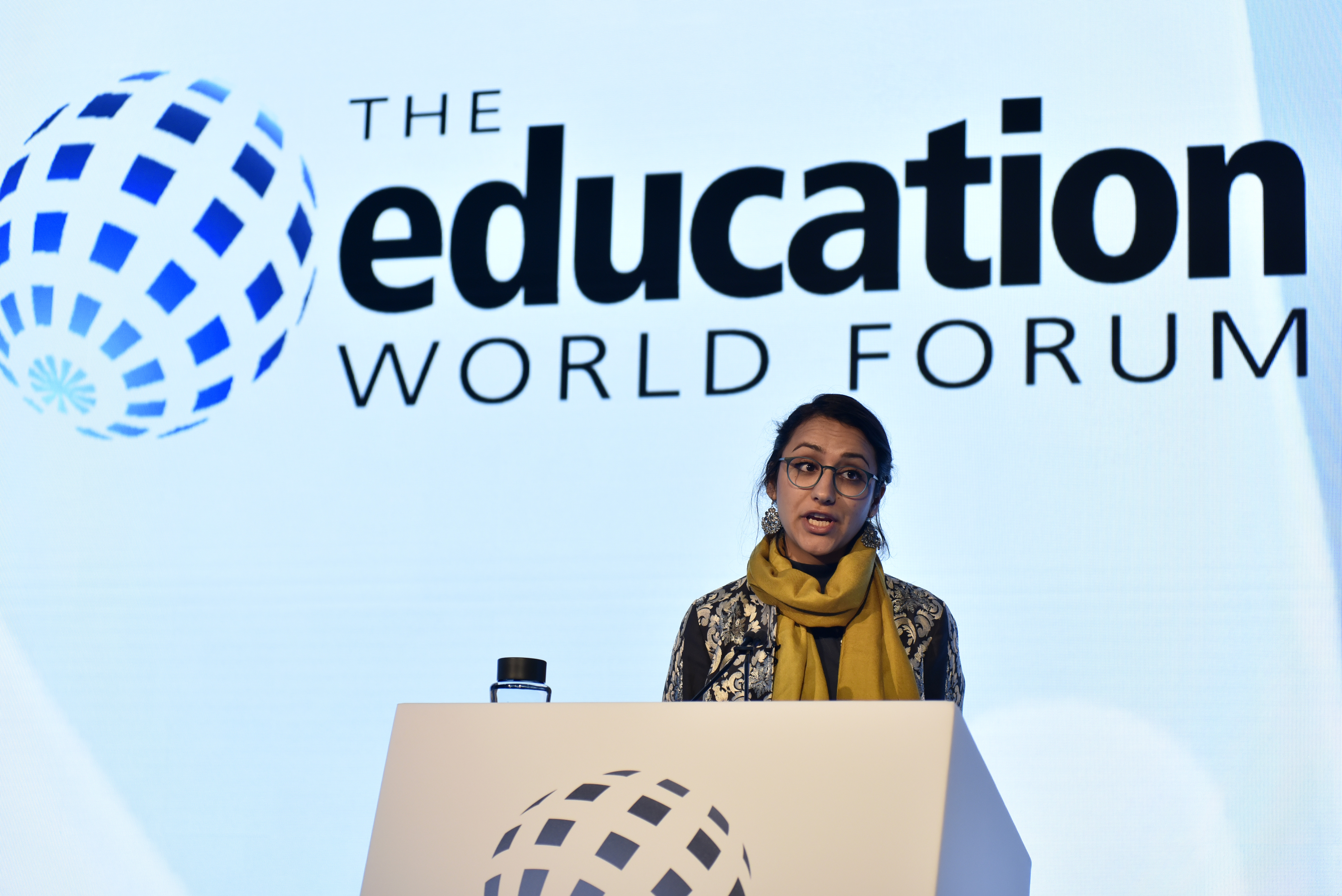
Education reform: confronting the bigger picture
Calls echoed across the EWF to be ambitious. To think big. To make bold commitments at the UN Transforming Education Summit in New York in September. LEGO Foundation’s Anne-Birgitte Albrectsen called on those gathered to “choose high ambition over business as usual.”
Andreas Schleicher warned that as we tackle the crisis surrounding the pandemic, we must not obfuscate huge challenges in our near future. The world is changing rapidly – be it the workforce, or the sources of information.
Talks circled the vital role education systems must play in addressing the most fundamental questions for the future of the world – including climate change and social inclusion. There was unanimous agreement on the power of education to create the behavioural change we need for a better world.
For example, Andreas Schleicher quoted the transformative potential of including refugees in quality schooling for both their individual lives and the national economy and society. He suggested we have so far missed out on the enormous financial and social benefits of providing high quality education for those with disabilities and gifts.
The impact of COVID-19 and the future of education
Some speakers encouraged ministers to look over the hill of COVID-19. Andreas Schleicher highlighted how beyond the ridge of the first digital divide, where children do not have adequate access to devices, internet and electricity, lies the second digital divide: that of digital navigation skills.
Minister Matsie Angela Motshekga of South Africa highlighted how COVID-19 has given us a taste of how big this challenge is – with health and education leaders having to work together to equip citizens with the capacity to identify fake news and conspiracy theories.
Similarly, though most agreed hybrid learning is likely to be the future of education, there was unanimous agreement that schools perform an essential social role. As we look beyond the immediate crises to the possible disruption of natural disasters and conflicts ahead – those at the EWF started to explore how we can better protect the social and emotional function of the classroom.
Peter Phillips, Chief Executive at Cambridge University Press & Assessment, spoke of the ways in which each part of an education system connects to another and how we must ensure we avoid narrow views as these can result in initiatives becoming a cycle of failure that reduces the quality of education overall.
Widening our thinking also transforms our approach. For example, Andreas Schleicher shared how a more equitable spread of resources equates to better PISA scores overall.
Taking a long-term view forces us to consider the sustainability of education solutions. In his opening speech, Peter Phillips said, “in a time of crisis, educators innovated, we achieved what was previously unimaginable. But is this frantic swimming – often against the tide – sustainable, and at what cost to wellbeing?”
Developing sustainable education systems
Ministers talked of the importance of retaining great teachers – and how they play one of the most impactful roles in improving a child’s education. But how can we retain teachers if what we expect of them is not sustainable? Likewise, Cambridge’s partnerships focus on building skills so that national and local governments develop the capabilities to sustainably manage quality education solutions in the longer term.
Dr Yaw Osei Adutwum, Minister of Education for Ghana, talked about the double-track approach he has taken to get more Ghanaians into secondary education. Faced with the challenge of not enough classrooms to educate the growing population, his government instigated a new pattern of school terms which allowed them to cycle different class groups at different times of the year to ensure they all got an education.
However, he also talked about the pressures this put on the system and how Ghana is simultaneously investing in expanding its infrastructure so there is a clear endpoint to the double-track approach and they can develop a sustainable long-term solution for all.
Education reform: collective vs. individual ambition
In addition to considering collective ambition, there was a rising trend at the EWF of prioritising fostering ambition in the individual citizen.
Many people emphasised the importance of developing a generation of entrepreneurs, who take charge of their own lives and confidently play an active role in society. Manish Sisodia, First Minister for Education in Delhi, revealed how he is trialling an entrepreneurial curriculum with almost a million students.
Others said how training people to be employers rather than looking for work could bridge the gap between skills and opportunities. Many agreed it was important that people were self-motivated to learn and that they could see the benefits for them and their families.
This was clear in the two lifelong learning initiatives highlighted by Secretary Leonor Briones of the Philippines: the Last Mile Schools programme and the Alternative Learning System.
Arbërie Nagavci, Minister of Education, Science, Technology and Innovation for the Republic of Kosovo, took this further and suggested encouraging teachers to have agency and think big can, in turn, help the student.
The power of partnership: turning possibility into practice
On the first day, Andreas suggested to the room that the challenge of transforming education for the better is not one of making the impossible possible, but one of making the possible attainable.
Dr Ruth Kagia asked, “What do we need to do differently beyond what we’re doing already?” One key, she said, was more strategic and deliberate partnerships.
Dr Amel Karboul put forward a new description of ‘PPP’ (usually ‘public-private partnership’): ‘partnership for public purpose.’
Dr Karboul emphasised a need to spend money, cut waste and spend better. Group discussion explored how research and evidence will be key to more effective spending – and how important international partnership and dialog is to this.
For example, at Cambridge, our new Partnership for Education Impact Framework provides a mechanism to consistently examine how education reform programmes contribute to systemic improvement, capacity development, sustainable practices and policy planning and design. This can be used by governments and international development organisations to inform effective policy making and spending.
Leaders highlighted cross-sector and border partnerships as essential to acting quickly and holistically. For example, universal access to the internet should not just be an education cost – it would also transform access to healthcare and the workplace.
‘A Cambridge Approach to Improving Education’ demonstrates the importance of system coherence, where because all the different components of an education system are connected, their alignment improves the chances of success in achieving education outcomes.
You don’t have to make changes to all aspects of an education system at once. Instead, change to a single aspect of a system, for example in curriculum, assessment or teacher support, can be highly successful if designed with awareness of how that particular aspect interacts and influences other parts of the education system. Frameworks like this can make it easier for governments to implement initiatives backed by research.
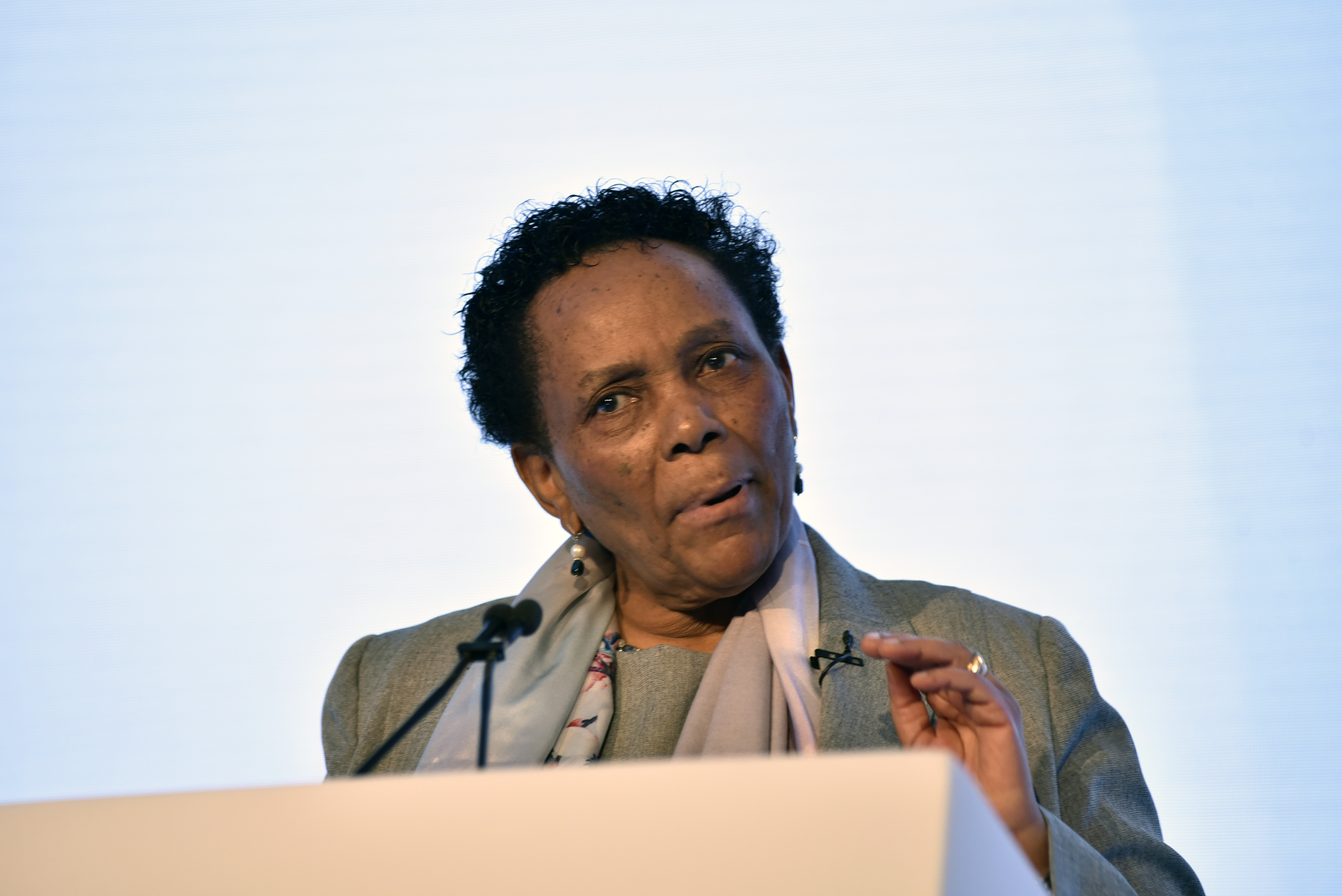
Incorporating technology into education systems
At the EWF, there was also widespread acknowledgement that technology is not the panacea – and that partnerships can help ensure it is used effectively and increases inclusivity.
Leaders and education specialists discussed how we need to make the right investments in technology – if you’re just putting the same paper textbooks on expensive devices and handing them out in contexts with limited internet and electricity, is that an effective use of money?
Verna Lalbeharie, Executive Director of the EdTech Hub, posed questions for collaboration – including “will this use of technology work for the most marginalised children and enhance equity?” and “will it lead to sustained impact on learning outcomes?”
Minister Agnes Naylonje of Malawi stressed how, often, it is not even that we don’t know what we need, it’s that we do not have the initial investment. She called on partners to work collaboratively with low-income nations like Malawi, where youth make up more than 75% of the country, to kickstart transformation.
Final thoughts: transforming education systems at the EWF 2022
We left the EWF invigorated to develop the education systems this generation deserves, together. It will certainly take ‘perseverance’ – the Cambridge Dictionary word of the year, highlighted at the opening of the event.
We asked delegates what their word of the year was – for one colleague from Nigeria it was ‘determination’, from Ukraine ‘bravery’, from Malaysia ‘hope’. For the EWF itself, perhaps it was urgency, ambition and possibility.
